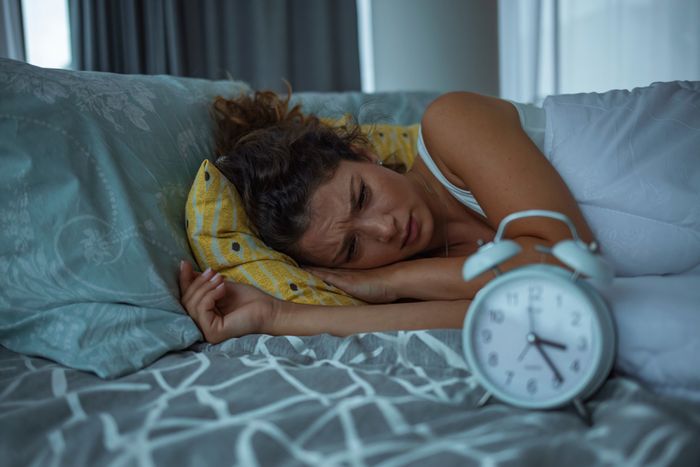Afraid of Falling Asleep? 6 Tips for Coping With Sleep Phobia and Anxiety
Published May 9, 2023.

People suffering from sleep anxiety and sleep phobia can find falling asleep terrifying. While those with sleep anxiety may experience feelings of worry over going to sleep, people with somniphobia (sleep phobia) have a more intense, irrational fear of falling asleep. Those with sleep phobia often experience extreme anxiety, breathing difficulties, mood swings, difficulty concentrating, feelings of impending doom, and even panic attacks. On the other hand, people with sleep anxiety usually show symptoms like irritability and restlessness.
Both sleep phobia and sleep anxiety can impact your physical and mental health and lead to long-term sleep deprivation, so it's important to try out different coping strategies to avoid their negative effects.
» Get your wellness back on track with our quiz
1. Incorporate Exposure Therapy
As sleep phobia is at its core no different than any other phobia, it can be helpful to try the treatment of choice for phobias—exposure therapy. This approach involves being gradually exposed to what you fear, helping slowly diminish the fear and anxiety until the phobia finally resolves itself.
In the case of sleep phobia, the exposure treatment would usually require you to initially imagine restful, trouble-free sleep and then move on to taking shorter naps before finally achieving longer sleep periods.
» Learn how much sleep you need each night
2. Try Cognitive Behavioural Therapy (CBT)
Cognitive behavioural therapy is used to eliminate any negative feelings by changing your thoughts and behaviours in relation to your issue. When it comes to applying CBT to sleep phobia and anxiety, you'd need to talk to a therapist to identify the negative thought and behaviour patterns that contribute to your problem and learn how to change them.
3. Maintain Good Sleep Hygiene
Good sleep hygiene involves multiple elements coming together to promote overall healthy sleep practices. For instance, it can include having a stable bedtime routine and establishing a set bedtime and wake time. You should also create an inviting sleep environment with comfortable bedding, optimal room temperature, and no unwelcome noises. Finally, try not using your phone or other electronics for 90 minutes before sleeping to give your brain time to wind down.
Maintaining good sleep hygiene can help manage sleep phobia or anxiety in various ways, such as promoting restful sleep through your adjusted environment. What's more, getting used to a set nighttime routine can signal to your brain that it's time to go to sleep so it becomes more receptive to the idea of sleep as something positive.
4. Rely on Relaxation Techniques
Winding down so you're ready to sleep can be difficult even under normal circumstances, let alone if you're terrified of sleep. However, relaxation and mindfulness techniques can help calm down your mind and body, opening you up toward the possibility of falling asleep more easily.
Deep breathing, guided mindfulness meditations and body scan exercises are all worth trying to help you get past your sleep phobia and anxiety and achieve rest more quickly.
» Try these meditation techniques to increase deep sleep
5. Exercise Regularly
Regular exercise is a proven way to reduce anxiety in general (1). Not only is exercise distracting enough to prevent feeling anxious but it also decreases muscle tension and raises heart rate, which helps release anxiety-reducing chemicals like serotonin, GABA, BDNF, and endocannabinoids.
Exercising regularly can be especially helpful for dealing with sleep phobia or anxiety because it also tires you out, which makes falling asleep easier physically.
6. Make Lifestyle Adjustments
Make sure your life habits aren't making it even harder for you to fall asleep. Sometimes, altering your lifestyle can help you combat your phobia of sleeping or sleep anxiety. For example, cutting down on your alcohol and caffeine intake can help improve your sleep quality, as both substances are known as possible sleep disruptors.
What's more, you should be extra careful with your sleep medications and avoid taking higher dosages when you don't feel sleepy or reducing your dosage if you don't want to sleep. Taking your medication only as prescribed can help ensure you get the most out of the medication, making approaching sleep easier.
Overcome Your Fears for Peaceful Sleep
In addition to being exhausting disorders that can impact the quality of your daily life, both sleep phobia and sleep anxiety are also potentially dangerous because they can lead to chronic sleep deprivation with symptoms like nausea.
Using a combination of different coping strategies seems to have the best effect in helping overcome the fear of sleep regardless of its cause. However, if your sleep phobia or anxiety is especially intense and coping techniques aren't helping, it's always best to consult a professional to get targeted support.








